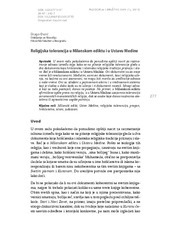Приказ основних података о документу
Religijska tolerancija u Milanskom ediktu i u Ustavu Medine
Religious tolerance in the Edict of Milan and in the Constitution of Medina
| dc.creator | Đurić, Drago | |
| dc.date.accessioned | 2021-10-12T11:39:58Z | |
| dc.date.available | 2021-10-12T11:39:58Z | |
| dc.date.issued | 2013 | |
| dc.identifier.issn | 0353-5738 | |
| dc.identifier.uri | http://reff.f.bg.ac.rs/handle/123456789/1547 | |
| dc.description.abstract | U ovom radu pokušaćemo da ponudimo opštiji nacrt za razmatranje odnosa između toga kako se na pitanje religijske tolerancije gleda u dva dokumenta koja hrišćanska i islamska religijska tradicija priznaju i slave. Reč je o Milanskom ediktu i o Ustavu Medine. Ovi dokumenti su za svoje vreme bili revolucionarni. Međutim, sami ovi dokumenti, kao i religijska učenja, na kojima su oni zasnovani, ne mogu biti merilo za uređivanje odnosa u naše vreme. Oni su izloženi u pojmovnom okviru i u vrednosnom sistemu koji je vladao u doba kada su ta učenja i ti dokumenti nastali. Mnogi odnosi koji su tada postojali, danas ne postoje. Na primer, u Milanskom ediktu afirmiše se opšte pravo na religiju, a u Ustavu Medine uzajamna tolerancija avramovskih monoteističkih religija, dok se osobe koje danas nazivamo ateistima ili agnosticima uopšte pominju. | sr |
| dc.description.abstract | In this paper, we will try to offer a blueprint for a more general discussion of the relation of how the question of religious tolerance appears in two documents that the Christian and Islamic traditions recognize and celebrate: namely, the Edict of Milan and the Constitution of Medina. These documents were revolutionary for their time. However, these documents alone, as well as religious teachings, on which they are based, cannot be the measure of relations in our time. They are presented in the conceptual framework and value system that prevailed at the time when these teachings and documents were created. Many relations the documents refer to no longer exist. For example, while the Edict of Milan affirms the general right to religion, and the Constitution of Medina affirms the mutual tolerance for Abrahamic, monotheistic religions - people who now declare themselves as atheists or agnostics are not even mentioned. | en |
| dc.publisher | Univerzitet u Beogradu - Institut za filozofiju i društvenu teoriju, Beograd | |
| dc.rights | openAccess | |
| dc.rights.uri | https://creativecommons.org/licenses/by-nc-nd/4.0/ | |
| dc.source | Filozofija i društvo | |
| dc.subject | Ustav Medine | sr |
| dc.subject | religijska tolerancija | sr |
| dc.subject | progon | sr |
| dc.subject | Milanski edikt | sr |
| dc.subject | judaizam | sr |
| dc.subject | islam | sr |
| dc.subject | hrišćanstvo | sr |
| dc.subject | the Constitution of Medina | en |
| dc.subject | religious tolerance | en |
| dc.subject | persecution | en |
| dc.subject | Judaism | en |
| dc.subject | Islam | en |
| dc.subject | Edict of Milan | en |
| dc.subject | Christianity | en |
| dc.title | Religijska tolerancija u Milanskom ediktu i u Ustavu Medine | sr |
| dc.title | Religious tolerance in the Edict of Milan and in the Constitution of Medina | en |
| dc.type | article | |
| dc.rights.license | BY-NC-ND | |
| dc.citation.epage | 292 | |
| dc.citation.issue | 1 | |
| dc.citation.other | 24(1): 277-292 | |
| dc.citation.rank | M24 | |
| dc.citation.spage | 277 | |
| dc.citation.volume | 24 | |
| dc.identifier.fulltext | http://reff.f.bg.ac.rs/bitstream/id/476/1544.pdf | |
| dc.identifier.rcub | https://hdl.handle.net/21.15107/rcub_reff_1547 | |
| dc.type.version | publishedVersion |

